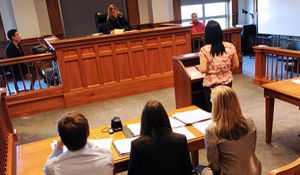The Rwanda-backed M23 rebels who seized eastern Congo’s key city of Goma have announced a unilateral ceasefire, effective Tuesday, citing humanitarian reasons amid urgent calls for safe passages for aid. This declaration marks a reflection of the deepening crisis following intense clashes between the M23 and Congolese forces, resulting in tragedy for the local population.
The announcement came shortly after the U.N. health agency reported at least 900 people had been killed since the fighting escalated last week. The violence has not only claimed lives but left over 2,900 others injured, pushing the health services to the brink as they struggle to cope with the influx of casualties.
Lawrence Kanyuka, the spokesperson for the M23 rebels, stated, “It must be made clear we have no intention of capturing Bukavu or other areas. We reiterate our commitment to protecting and defending the civilian population and our positions.” This assertion came at a time when reports suggested the rebels were advancing toward other provincial capitals, building on their control over Goma, which lies at the heart of one of the world’s richest mineral regions.
The city of Goma, with its population of around 2 million, remains significantly impacted by recent turmoil. Families have been seen gathering at morgues, desperate to identify their loved ones. Chiza Nyenyezi tragically recounted her son’s gunshot wound, stating, “His entire chest was open.” Another grieving mother, Louise Shalukoma, expressed despair over her fourth child’s death, lamenting, “My God, my fourth child, when I saw he was dead I said, 'Lord, what am I going to do?'” Their heart-wrenching stories highlight the human cost of the conflict.
From the onset of the fighting, Goma’s healthcare infrastructure has been severely stretched. Hospitals like Bethesda Hospital are now receiving over 100 new patients each day, far exceeding their capacity of 250 beds. Medical providers from organizations like Doctors Without Borders have reported alarming increases in the number of bullet wound admissions. One surgeon, Johnny Kasangati, noted, “We removed 48 bullets yesterday,” underscoring the gravity of the situation.
The international community has been closely observing this crisis. Kenya’s President William Ruto announced the upcoming attendance of regional leaders from Congo and Rwanda at various summits intended to restore peace. Meanwhile, foreign ministers from the Group of Seven advanced economies have urged all parties to allow the “rapid, safe and unimpeded passage of humanitarian relief for civilians,” emphasizing the pressing need for aid.
Despite claims of defending ethnic Tutsis from alleged Hutu persecution tied to historical conflicts, the M23’s activities have drawn heavy scrutiny. Experts note the group is vastly more powerful than the numerous armed factions operating within eastern Congo, with approximately 4,000 Rwandan troops supporting their cause—far more than during their earlier conflict when they briefly captured Goma before withdrawing under international pressure.
While the ceasefire offers a glimmer of hope, it remains uncertain how long it will hold, especially as the rebels have not indicated their readiness to relinquish control over the economically strategic Goma. Local residents fear they may face continued volatility, as they attempt to navigate this complex and dangerous reality.
The current situation demands urgent attention, not only to prevent civilian casualties but also to facilitate access to humanitarian aid for the hundreds of thousands displaced by the recent conflicts. With lives at stake, restoring peace and security has never been more imperative for the region.



